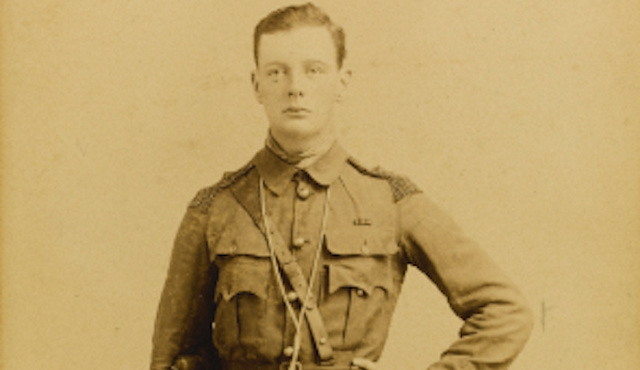Winston Churchill and Islam—Part Three

In the evenings one can imagine them recounting tales of the former glory days of Islam, continues Churchill,
[when] the Mullah will raise his voice and remind them of other days when the sons of the prophet drove the infidel from the plains of India, and ruled at Delhi, as wide an Empire as the Kafir holds to-day: when the true religion strode proudly through the earth and scorned to lie hidden and neglected among the hills: when mighty princes ruled in Bagdad, and all men knew that there was one God, and Mahomet was His prophet. And the young men hearing these things will grip their Martinis[1], and pray to Allah, that one day He will bring some Sahib—best prize of all—across their line of sight at seven hundred yards so that, at least, they may strike a blow for insulted and threatened Islam.[2]
Though Churchill admires the courage of the Ghazi[3], he abhors their “wild fanaticism”.[4]
Britain had put in place the Forward Policy, which reflected British concerns about the security of India against possible incursions by Russia, and was identified with a desire for influence on and control of strategic cities, and for the annexation of states and territories on the Indian border. Churchill explains the strategic importance of the town of Chitral.
During the two years that the British flag had floated over Chakdara and the Malakand the trade of the Swat Valley had nearly doubled. As the sun of civilisation rose above the hills, the fair flowers of commerce unfolded, and the streams of supply and demand, hitherto congealed by the frost of barbarism, were thawed….[5]
But a single class had viewed with quick intelligence and intense hostility the approach of the British power. The priesthood of the Afghan border instantly recognised the full meaning of the Chitral road. The cause of their antagonism is not hard to discern. Contact with civilisation assails the ignorance, and credulity, on which the wealth and influence of the Mullah depend. A general combination of the religious forces of India against that civilising, educating rule, which unconsciously saps the strength of superstition, is one of the dangers of the future. Here Mahommedanism [Islam] was threatened and resisted. A vast, but silent agitation was begun. Messengers passed to and fro among the tribes. Whispers of war, a holy war, were breathed to a race intensely passionate and fanatical. Vast and mysterious agencies, the force of which is incomprehensible to rational minds, were employed. More astute brains than the wild valleys of the North produce conducted the preparations. Secret encouragement came from the South—from India itself. Actual support and assistance was given from Cabul.
In that strange half light of ignorance and superstition, assailed by supernatural terrors and doubts, and lured by hopes of celestial glory, the tribes were taught to expect prodigious events. Something was coming. A great day for their race and faith was at hand. Presently the moment would arrive. They must watch and be ready. The mountains became as full of explosives as a magazine. Yet the spark was lacking.
At length the time came. A strange combination of circumstances operated to improve the opportunity. The victory of the Turks over the Greeks; the circulation of the Amir’s book on ‘Jehad [Jihad]’; his assumption of the position of a Caliph of Islam, and much indiscreet writing in the Anglo-Indian press, [Articles in Anglo-Indian papers on such subjects as The Recrudescence of Mahommedanism [Islam] produce more effect on the educated native mind than the most seditious frothings of the vernacular press] united to produce a ‘boom’ in Mahommedanism [Islam]].
The moment was propitious; nor was the man wanting. What Peter the Hermit was to the regular bishops and cardinals of the Church, the Mad Mullah was to the ordinary priesthood of the Afghan border. A wild enthusiast, convinced alike of his Divine mission and miraculous powers, preached a crusade, or Jehad [Jihad], against the infidel. The mine was fired. The flame ran along the ground. The explosions burst forth in all directions. The reverberations have not yet died away.[6]
AUTHOR
RELATED ARTICLES:
Winston Churchill and Islam—Part One
Winston Churchill and Islam—Part Two
EDITORS NOTE: This Jihad Watch column is republished with permission. All rights reserved.
SOURCES:
[1] That is of course a reference to the rifle and not the cocktail: “The Martini–Henry is a breech-loading single-shot rifle with a lever action that was used by the British Army. It first entered service in 1871, eventually replacing the Snider–Enfield, a muzzle-loader converted to the cartridge system. Martini–Henry variants were used throughout the British Empire for 47 years.”
[2] MFF, p.8.
[3] The Ghazi was someone who has taken part in military expeditions to rid the land of infidels.
[4] MFF, p.9.
[5] MFF, p.27.
[6] MFF, pp.27-28


Leave a Reply
Want to join the discussion?Feel free to contribute!